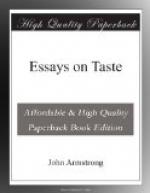Title: Essays on Taste
Author: John Gilbert Cooper, John Armstrong, Ralph Cohen
Release Date: September 15, 2004 [EBook #13464]
Language: English
Character set encoding: ASCII
*** Start of this project gutenberg EBOOK essays on taste ***
Produced by S.R.Ellison, David Starner, and the Online
Distributed
Proofreading Team.
The Augustan Reprint Society
Essays on taste
from
John Gilbert Cooper
Letters Concerning Taste
Third Edition (1757)
&
John Armstrong
Miscellanies
(1770)
With an Introduction by
Ralph Cohen
Publication Number 30
Los Angeles
William Andrews Clark Memorial Library
University of California
GENERAL EDITORS H. Richard Archer, Clark Memorial Library Richard C. Boys., University of Michigan Edward Niles Hooker, University of California, Los Angeles John Loftis, University of California, Los Angeles
ASSISTANT EDITOR
W. Earl Britton, University
of Michigan
ADVISORY EDITORS Emmett L. Avery, State College of Washington BENJAMIN BOYCE, Duke University LOUIS I. BREDVOLD, University of Michigan CLEANTH BROOKS, Yale University JAMES L. CLIFFORD, Columbia University ARTHUR FRIEDMAN, University of Chicago LOUIS A. LANDA, Princeton University SAMUEL H. MONK, University of Minnesota ERNEST MOSSNER, University of Texas JAMES SUTHERLAND, Queen Mary College, London H.T. SWEDENBERG, JR., University of California, Los Angeles
INTRODUCTION
The essays on taste taken from the work of John Gilbert Cooper and John Armstrong and reprinted in this issue are of interest and value to the student of the eighteenth century because they typify the shifting attitudes toward taste held by most mid-century poets and critics. Cooper, who accepts the Shaftesbury-Hutchesonian thesis of the internal sense, emphasizes the personal, ecstatic effect of taste. Armstrong, while accepting the rationalist notions of clarity and simplicity, attacks methodized rules and urges reliance on individuality.
Following Shaftesbury and Hutcheson closely, Cooper treats taste as an immediate, prerational response of an internal sense to the proportion and harmony in nature, a response from an internal harmony of the senses, imagination, and understanding to a similar harmony in external nature. Cooper defines the effect of good taste as a “Glow of Pleasure which thrills thro’ our whole Frame.” This “Glow” is characterized by high emotional sensibility, and it thus minimizes the passivity which Hutcheson attributes to the internal sense.




